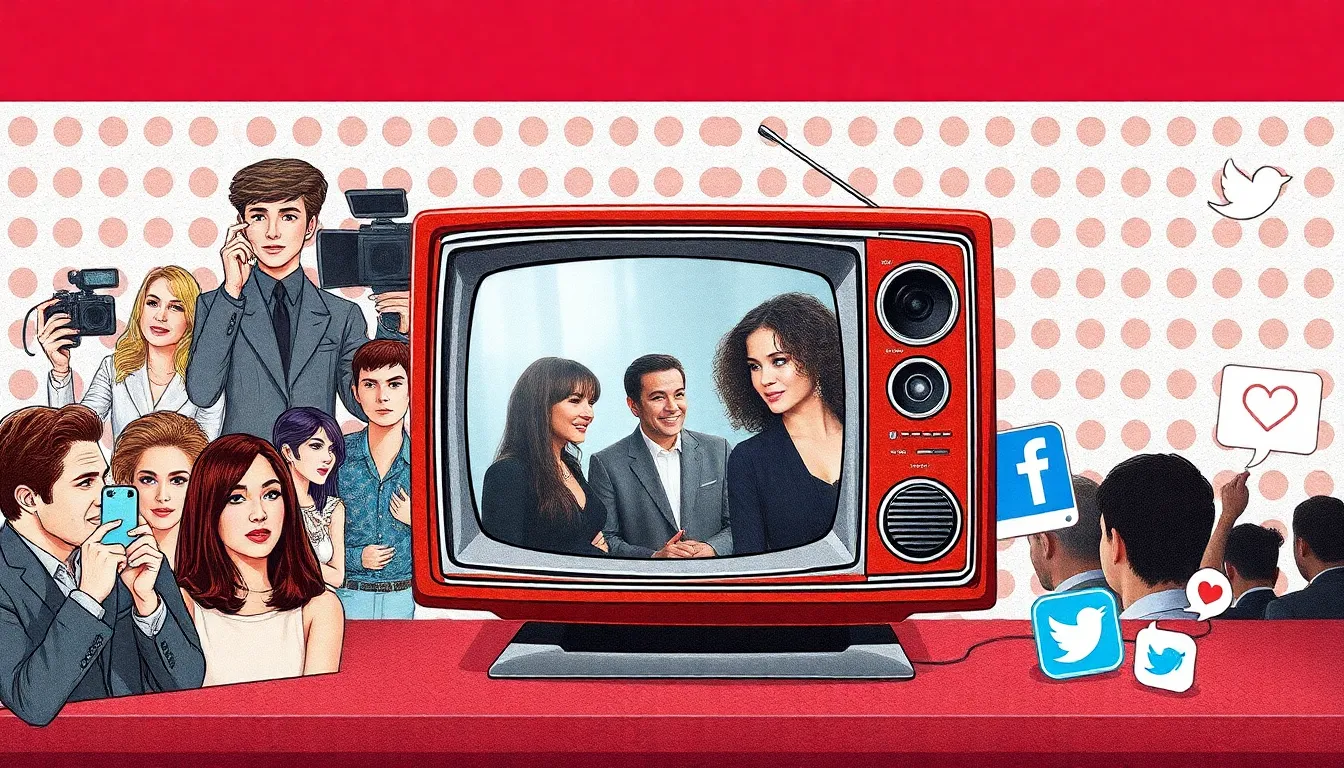In the world of television, drama isn’t just confined to the screen. From scandalous breakups to unexpected feuds, TV gossip keeps fans on the edge of their seats, eagerly waiting for the next juicy tidbit. Who needs fictional plot twists when real-life celebrities deliver the kind of chaos that even the best writers couldn’t dream up?
Table of Contents
ToggleOverview of TV Gossip
TV gossip fascinates audiences, intertwining celebrity lives with viewer interests. Breakups, feuds, and unexpected alliances dominate tabloids, revealing conflicts that captivate fans. This genre thrives on chaos, where real events often outshine scripted dramas.
Fans engage deeply with behind-the-scenes antics and personal revelations. Celebrity relationships draw attention, drawing debate and speculation among viewers. Various media platforms, including social media and entertainment news websites, amplify this buzz, sharing the latest scoop instantly.
Audience reactions fuel the cycle of gossip, creating an ongoing demand for updates. Viewers invest emotionally in these narratives, discussing them within their social circles. The unpredictability injects an element of surprise, keeping discussions lively and ongoing.
Public perceptions shift constantly, influenced by paparazzi photos and insider information. Each revelation or scandal sparks interest, encouraging fans to speculate about motives and future events. Platforms like Twitter and Instagram serve as essential tools for celebrities, allowing them to share personal updates directly with followers.
Emerging trends show a growing appetite for authenticity, as celebrities navigate their public personas. Transparency often leads to stronger connections with fans. This dynamic illustrates how TV gossip continues to evolve, reflecting societal changes and audience expectations. Each twist and turn fuels excitement, ensuring that gossip remains an integral part of the television landscape.
The Evolution of TV Gossip

TV gossip has continually transformed, shaping and reflecting cultural dynamics. It thrives on celebrity interactions that captivate audiences across various platforms.
Historical Context
Television gossip traces roots back to the mid-20th century. In the 1950s, tabloids like The National Enquirer brought celebrity lives into public consciousness. Viewers first encountered gossip segments in news programs, framing celebrity incidents as entertaining narratives. By the 1990s, shows such as “Entertainment Tonight” established gossip as a staple of TV evening lineups. As digital platforms emerged, access to celebrity news became instant. Social media platforms amplified this shift, enabling fans to engage directly with celebrity gossip in real-time.
Key Moments in TV Gossip
Several pivotal moments define the landscape of TV gossip. Princess Diana’s death in 1997 sparked intense media speculation and discussions about privacy. The infamous 2004 Super Bowl “wardrobe malfunction” generated widespread controversy and highlighted the intertwining of celebrity and media scrutiny. The rise of social media transformed reporting; scandals could now trend within hours. The explosive revelations from the #MeToo movement in 2017 reshaped conversations around celebrity accountability. Each of these incidents reshaped viewer perceptions, signaling how gossip remains a dominant force in popular culture.
Major Players in TV Gossip
TV gossip thrives on the interplay between various influential figures. Celebrities play a crucial role in shaping the narrative, captivating audiences with their lives.
Celebrities and Their Influence
Celebrities drive the buzz surrounding TV gossip. Their relationships, scandals, and personal triumphs resonate deeply with fans, often becoming trending topics. Reality show stars, A-list actors, and musicians capture public interest, with their actions and decisions fueling speculation. Additionally, unexpected twists in their lives create opportunities for gossip to flourish. Public appearances, social media posts, and interviews reveal elements of their personalities that fans adore. In turn, this visibility influences public perception, linking personal storylines with broader cultural conversations.
Gossip Columnists and Bloggers
Gossip columnists and bloggers act as the gatekeepers of celebrity news. They curate information from various sources, often breaking exclusive stories that pique public curiosity. Their writing styles and opinions shape how gossip is consumed, making these figures integral to the landscape. Each article or post can spark a wave of discussion, pushing certain narratives into the spotlight. Many columnists leverage social media to expand their reach, engaging audiences directly and offering fresh insights. This dynamic allows for real-time reactions and interactions, ensuring that gossip remains vibrant and ever-evolving.
Impact of Social Media on TV Gossip
Social media significantly influences how TV gossip spreads and evolves. Instant access to news shapes audience engagement, keeping fans constantly updated.
Instant News Cycle
Real-time updates dominate the landscape. News travels faster than ever through platforms like Twitter and Instagram. Events unfold live, allowing public reactions to occur almost immediately. Celebrities often share personal stories directly, creating direct connections with their followers. This immediacy generates buzz around events, leading to heightened anticipation for new developments. For example, when a celebrity announces a breakup or an engagement, it can trend within minutes, overshadowing traditional media outlets. The continuous flow of information fosters a culture of speculation and discussion, ensuring that gossip remains relevant and engaging.
Public Reactions and Engagement
Public reactions play a crucial role in shaping the narrative. Fans express opinions on social media, fostering discussions around celebrity lives. Comment sections on posts become hotbeds of debate, revealing audience sentiments. Shares and likes amplify stories, granting them more visibility and reach. Memes and fan edits emerge, adding humor or critique to the mix. This participatory culture enhances the gossip experience, turning individual opinions into collective noise. Social media platforms also serve as gauges for public interest, influencing how gossip is perceived and presented. When a topic garners significant attention, it often escalates, drawing in mainstream media coverage and further igniting public fascination.
Ethical Considerations in TV Gossip
Ethical considerations in TV gossip influence how stories develop and are consumed. Transparency matters as audiences increasingly demand authenticity. Paparazzi practices often blur ethical lines, raising questions about privacy. Ensuring respect for the individuals involved can prevent unnecessary harm.
The role of gossip columnists includes curating content responsibly. Sensationalism may attract views but can also misrepresent the truth. Misleading narratives may arise from incomplete information, leading to public backlash. Fair representation of those involved fosters constructive dialogue rather than perpetuating negativity.
Gossip’s impact extends beyond ratings. Significant events, like the #MeToo movement, underscore the essential nature of ethical reporting. Journalism ethics necessitate accuracy, fairness, and integrity, which contribute to a healthier media landscape. Emphasizing accountability allows for better relationships between celebrities and their audiences.
Awareness of mental health effects on individuals targeted by gossip is crucial. Celebrity lives become part of the public sphere but they also endure personal struggles. Misguided narratives can lead to distress, making ethical reporting even more imperative. A commitment to compassionate storytelling creates a sustainable gossip culture.
Legislation addressing privacy varies across regions. Understanding these laws enables media outlets to navigate gossip responsibly. Compliance with regulations ensures that journalism remains a trusted source of information. Ethical considerations ultimately shape the future of TV gossip, promoting respect and honesty among all stakeholders.
TV gossip continues to captivate audiences by blending reality with the unpredictable chaos of celebrity lives. As fans engage with the latest scandals and personal revelations, they foster a vibrant culture of discussion and speculation. The evolution of media platforms has only intensified this phenomenon, allowing real-time updates that keep viewers hooked.
With a growing demand for authenticity and ethical reporting, the landscape of TV gossip is shifting. Celebrities are now more aware of their public personas, navigating the fine line between privacy and public interest. As the genre adapts to societal changes, it remains a powerful force in shaping popular culture and influencing viewer perceptions. The future of TV gossip promises to be as dynamic and engaging as the stories it tells.



